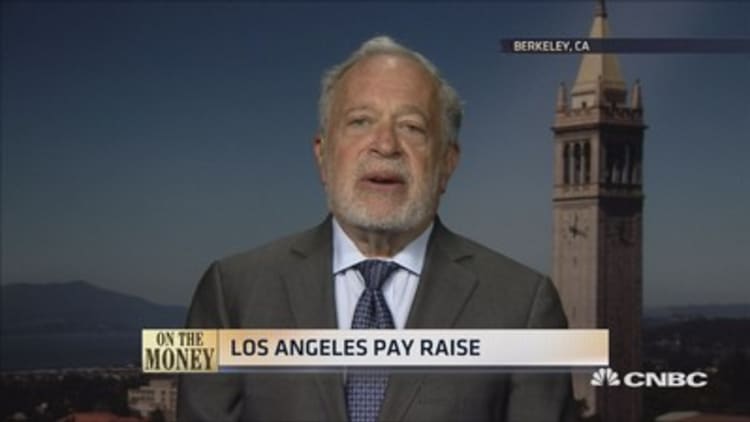
The high cost of housing across the U.S. has made Americans pessimistic about the prospect of social and economic mobility, a new study by the MacArthur Foundation finds.
The research released Tuesday states 79 percent of Americans – across all ages and political party affiliations -- believe it is more common for people to fall out of the middle class than rise up to it.
"We expected to see some pessimism for this, but the depth and breadth of this is quite profound," said Rebecca Naser, a member of the team who conducted the research.
More from USA Today:
Bird flu spikes egg prices; some hit $3 a dozen
5 fabulous Father's Day deals under $50
Major money mistakes for seniors and retirees
The Housing Matters report surveyed 1,401 adults over the span of two weeks for the third annual study, and allowed the respondents to define affordability for themselves. The MacArthur Foundation commissioned Hart Research Associates to complete the study.
The MacArthur Foundation, founded in 1970 by John D. and Catherine T. MacArthur, is one of the country's largest private foundations and provides research grants for mostly liberal causes. The group has been studying how housing affects families and communities since 2008 in an ongoing $25 million research drive, with over 40 projects underway. The research examines economic mobility, education and the well-being of children, among other factors.
The report aims to influence policy makers to enact housing policy reforms to provide more affordable housing in the country, according to the MacArthur Foundation.
In a statement, MacArthur President Julie Stasch called the survey a "wake-up call," as the continuation of the American Dream appears dim for some.
Read MoreBest and worst cities to retire
The study finds that housing costs for Americans lead to larger problems beyond difficulty in finding a dream home. Housing prices have skyrocketed in recent years, while income levels remain stagnant, the report states. The federal minimum wage has remained at $7.25 per hour since 2009, though President Obama is pushing for an increase to $10.10.
The report also noted a lack of confidence in the government – at national and local levels – in putting affordable housing at the forefront of the policy agenda. While a lot of focus has been on improving education and healthcare costs, the study suggests Americans want housing affordability on the minds of their political representatives.
The study found 55 percent of Americans have made some sort of financial sacrifice to afford their housing, including no longer saving for retirement or taking on a second job.
"This happens in two directions: one where the income isn't coming up, and the other that things are getting more expensive," said Geoff Garin, another member of the research team. "I think Americans are telling us through this research that the absence of the discussion about housing is a substantial lapse."
Read MoreCollege costs are on kids: Survey
The study also found Millennials, while optimistic and hopeful for the future, believe chances of economic mobility are bleak. About 70 percent of Millennials believe it's more difficult today than decades ago to achieve a middle class lifestyle.
The survey defined this lifestyle as one where people can save for retirement, feel safe in their communities, eat healthy and cover the costs of housing with less than 30 percent of their income.
According to the foundation, rent for lower income families amounts for 80 percent of their annual income, resulting in fewer investments in food, healthcare, education and other needs.
Read MoreMore states consider automatic IRAs
Linda Couch, senior vice president for policy at the National Low Income Housing Coalition, said the study's findings were "disconcerting," though "expected." The study found some Americans believe the federal government should not be tasked with finding a solution to the issue.
Couch said she wished the report detailed what other solutions would be possible without federal government involvement.
"I'd be interested to see whose responsibility would it be," Couch said. "It's our keen sense that the private marketplace isn't about to step up and solve America's housing problem."
Couch said a National Housing Trust Fund was authorized by Congress in 2008 and would grant tax benefits to low-income homeowners. The trust fund is a solution, Couch says, but lacks funding for implementation.
"The income constraints that Congress has imposed on itself are really holding Congress back from implementing any real solutions," Couch said.
Read MoreThis generation is the most financially insecure?
Last year, the annual survey found that 70 percent of Americans believe the housing crisis of 2008 is still in full effect. During the crisis in 2008, the country saw housing prices plummet, which led to a host of foreclosures. This year, the results were slightly more optimistic, as 35 percent of Americans believe the crisis is over, compared to the 25 percent that believed the same in 2014.
The foundation plans to continue this study for several more years to better understand the trends and changes of American perceptions of housing affordability over time.

